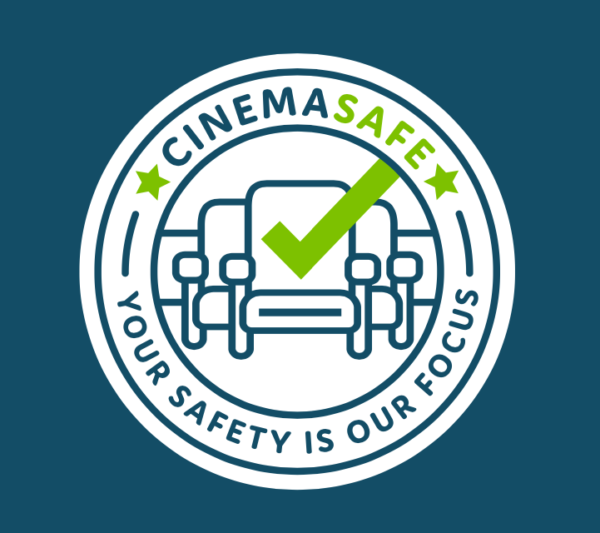By Kathy Conroy, Exhibitors Embrace ‘CinemaSafe’ Health and Safety Protocols
The National Association of Theatre Owners (NATO) launched CinemaSafe, a set of voluntary health and safety protocols for exhibitors in the Covid-19 pandemic era. More than 380 exhibition companies in the U.S., comprising more than 3,000 locations and 33,000 screens, have voluntarily agreed to meet or exceed the set of baseline Covid-19 health and safety practices. Participating movie theaters are now displaying the CinemaSafe logo and protocols on their websites, as well as at their theater locations, to assure moviegoers that important steps have been taken to protect their health and safety.
Developed in consultation with leading epidemiologists and industry experts, and consistent with Centers for Disease Control (CDC), World Health Organization (WHO), and Occupational Safety and Health Administration (OSHA) guidelines, the protocols call for mandatory mask wearing by employees and patrons (even in states that do not require it), physical distancing, limited capacity in auditoriums, enhanced ventilation, extensive cleaning, contactless transactions, employee training, and more. NATO’s Cinema Reopening-Operations Task Force studied the recommendations of experts and developed the guidelines over the early months of the cinema closures. NATO’s Executive Board reviewed and approved the protocols, and the CinemaSafe program was launched on August 21, 2020, in a virtual press conference.
John Fithian, president and CEO of NATO, said, “In this new pandemic world, moviegoers need to know that there is a consistent, science- and experience-based set of health and safety protocols in place no matter what theater they visit. This unprecedented industry-wide effort is a promise designed to meet that need.”
David F. Goldsmith, PhD, an occupational and environmental epidemiologist at George Washington University’s Milken Institute School of Public Health, reviewed the CinemaSafe protocols and observed, “It is important to note that, in my review of the medical literature, not a single case of Covid-19 has been traced to a movie theater around the world, either before the shutdown, or since theaters have reopened in many countries and some U.S. states. These protocols, and the way they were developed, demonstrate a serious, comprehensive effort by movie theater owners to examine every aspect of their operations, identify potential risks, and reduce them. Their emphasis on the health and safety of their employees is an indication of their preventative commitment to moviegoer safety.”
Joyce Sanchez, M.D., an infectious disease specialist and director of Travel Health Clinic at Froedtert & the Medical College of Wisconsin as well as an assistant professor of medicine at the Medical College of Wisconsin, also examined the protocols. “First,” she said, “these protocols outline that it is of the utmost importance to be flexible, to respect local and state public health department guidance, and to respond to changes. Secondly, they address two of the three general concepts that factor into activity risk: distance, dose, and duration. The CinemaSafe protocols include physical distancing, limited capacity in auditoriums, mandatory mask wearing, frequent disinfection of surfaces, specific safety training for employees, and optimization of HVAC systems. They also offer a touchless experience. As far as duration, the length of a feature cannot be controlled. However, the length of a movie is similar to the amount of time spent on a domestic flight or dining at a restaurant. While every activity outside the home carries risks, these additional measures can help to mitigate them.”
The CinemaSafe health and safety protocols include:
- Masks Required All employees must wear a face covering or mask. With limited exceptions, patrons must wear a face covering at all times while in the auditorium and common areas of the theater. Exceptions to this policy include those unable to wear face coverings such as children under 2 years of age and individuals with certain medical/physical conditions that inhibit their ability to safely wear face coverings. In addition, face coverings may be removed for the limited purpose and limited time period necessary to consume food and beverages, if approved by state or local health authorities. Those who are unwilling to wear a face covering will be denied entry.
- Physical Distancing Appropriate physical distancing must be maintained at all times between patrons, except members of the same household or those who attend together.
- Reduced Capacity Theaters will explore novel options to minimize the number of patrons in an auditorium. Appropriate physical distancing must be maintained at all times between patrons, except members of the same household or those that attend together.
- Modified Concessions Minimize cash transactions and encourage credit cards or contactless payments whenever possible. Theaters will eliminate communal food and condiments that requires shared serving utensils or equipment.
- Mobile Ticketing Tickets sales should be available online or via phone whenever feasible to reduce the need to stand in line for tickets. Alternatives to paper tickets should be used whenever possible.
- Frequent Hand Washing Employees should be trained on hand-hygiene practices and are required to wash hands frequently at easily accessible hand-washing facilities.
- Hand Sanitizer Hand sanitizer with at least 60% alcohol (EPA approved ethanol or isopropyl) will be liberally placed in easily accessible public areas, and patrons will be encouraged by staff and appropriately placed signage to practice hand hygiene.
- Enhanced Cleaning Auditoriums should be carefully disinfected between movie screenings. High-touch surfaces should be wiped down periodically with EPA-registered disinfectant.
- Employee Health Training All employees should be trained on the signs and symptoms of Covid-19 as well as local theater policies and procedures.
- Air Filtration All HVAC systems should be in working order with increased ventilation whenever possible.
NATO and its member companies are engaged in a wide-ranging campaign to educate the public on what to expect as they return to movie theaters and to encourage responsible behavior toward their fellow moviegoers.
The complete set of CinemaSafe protocols are available at: www.CinemaSafe.org



Share this post